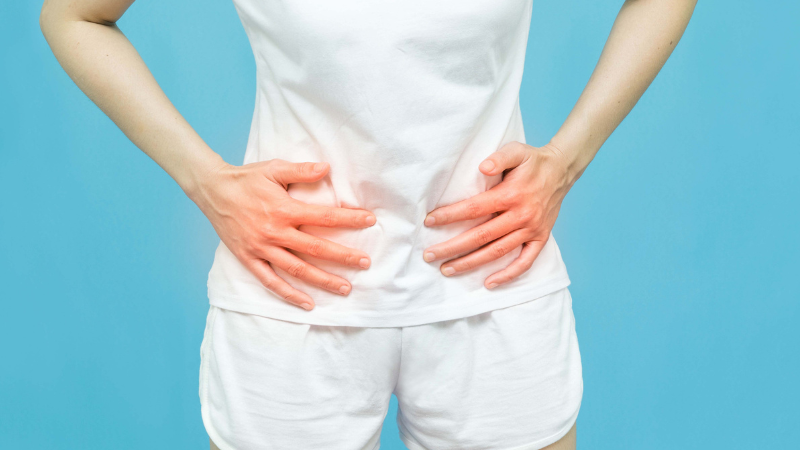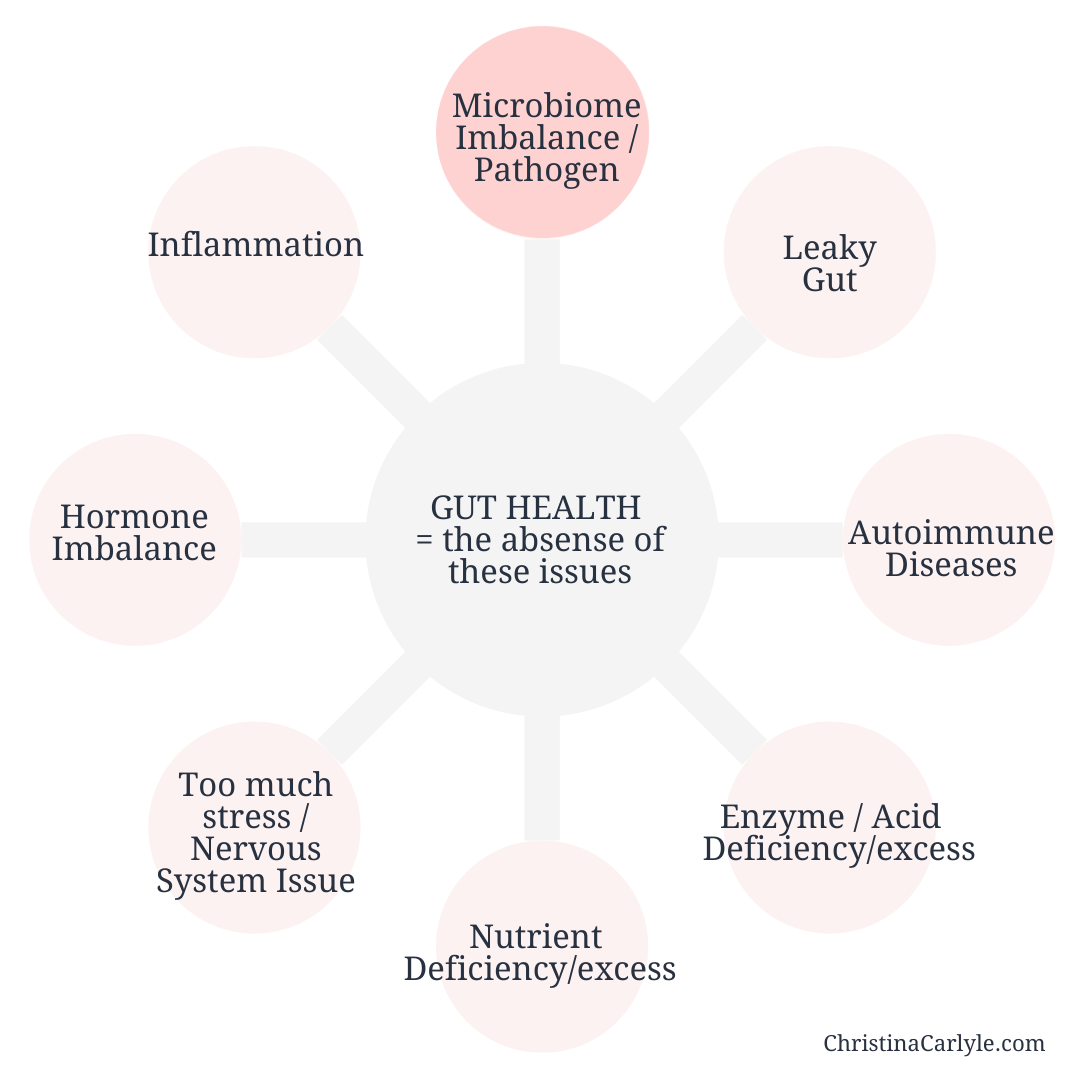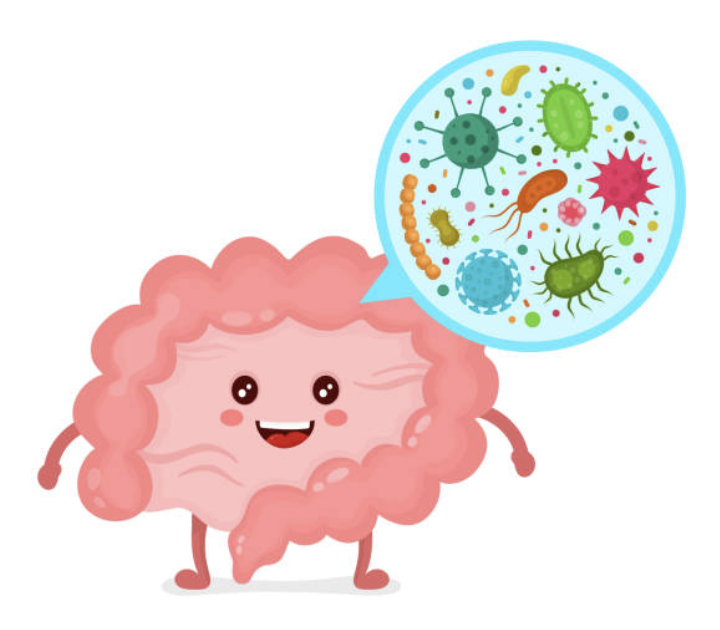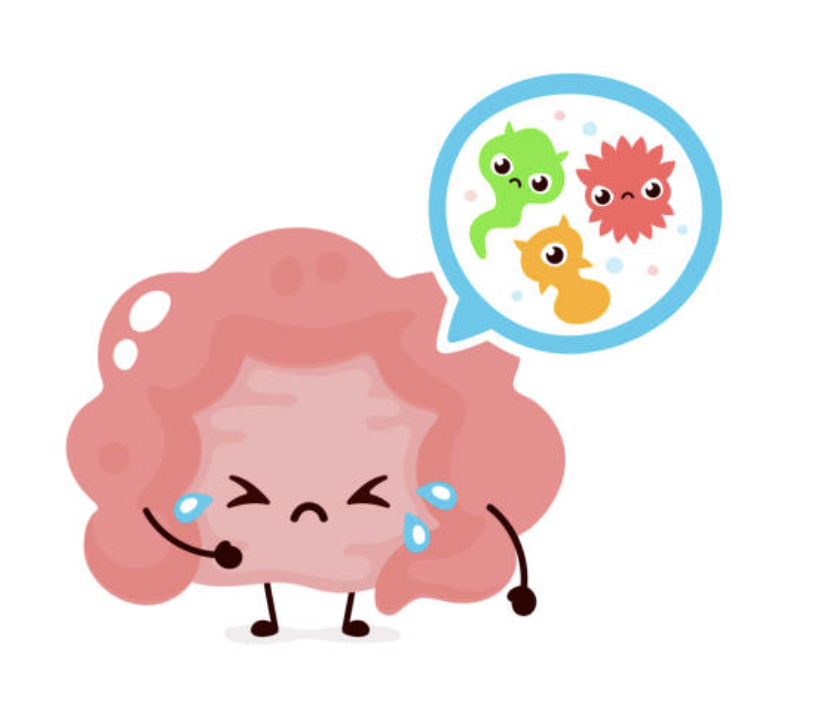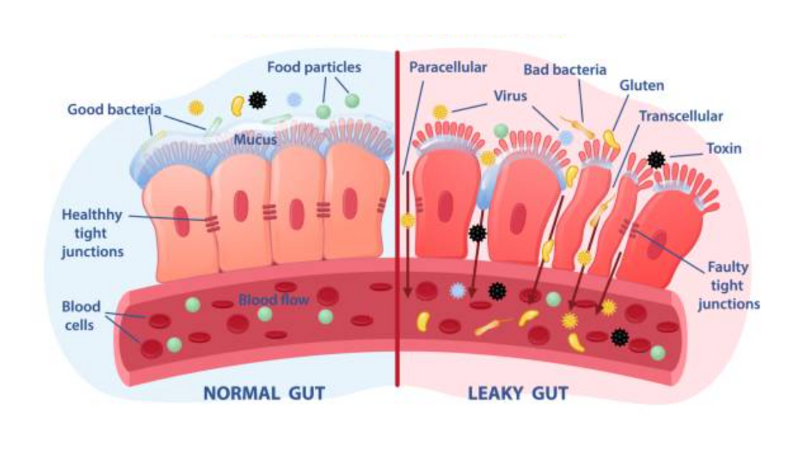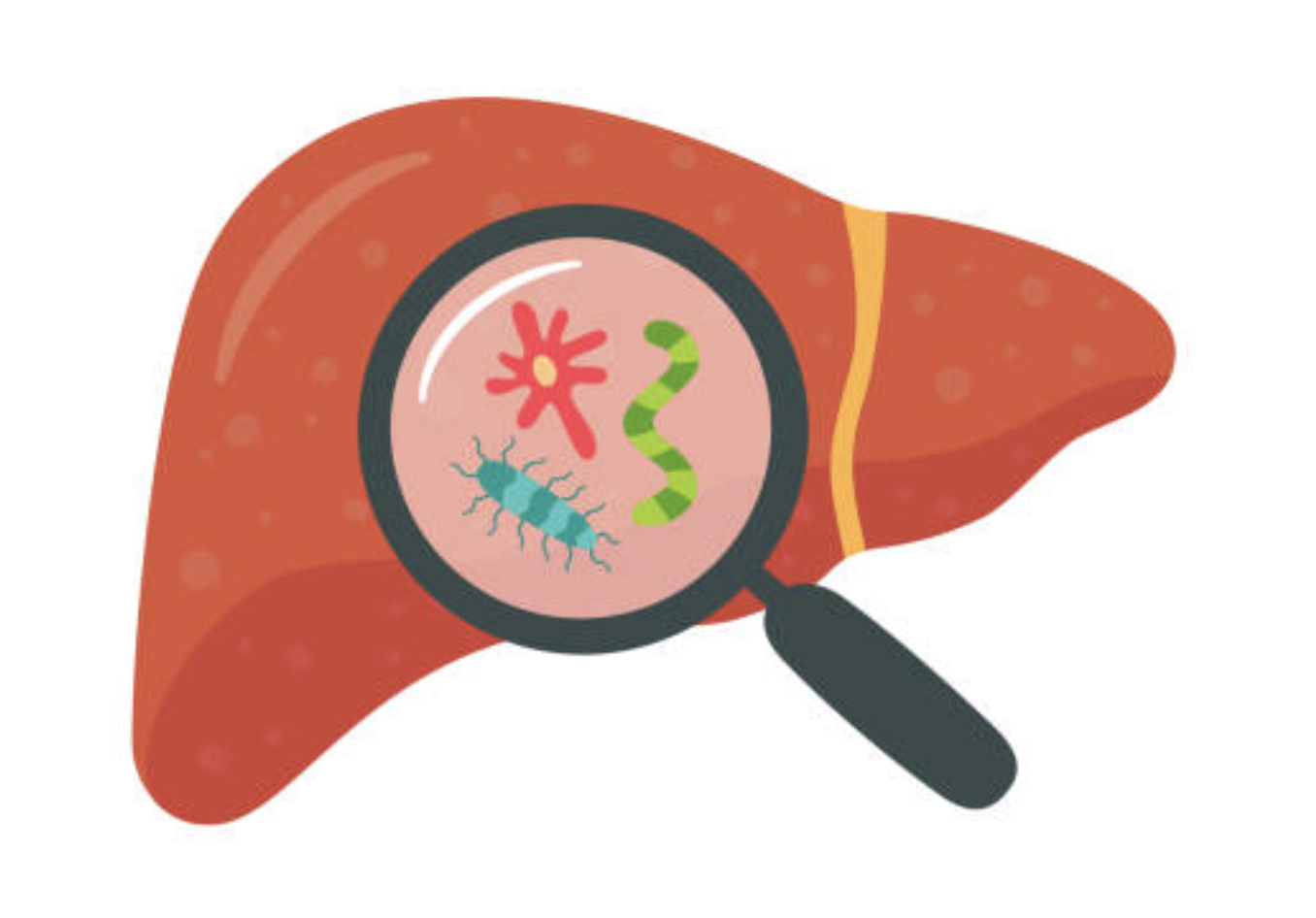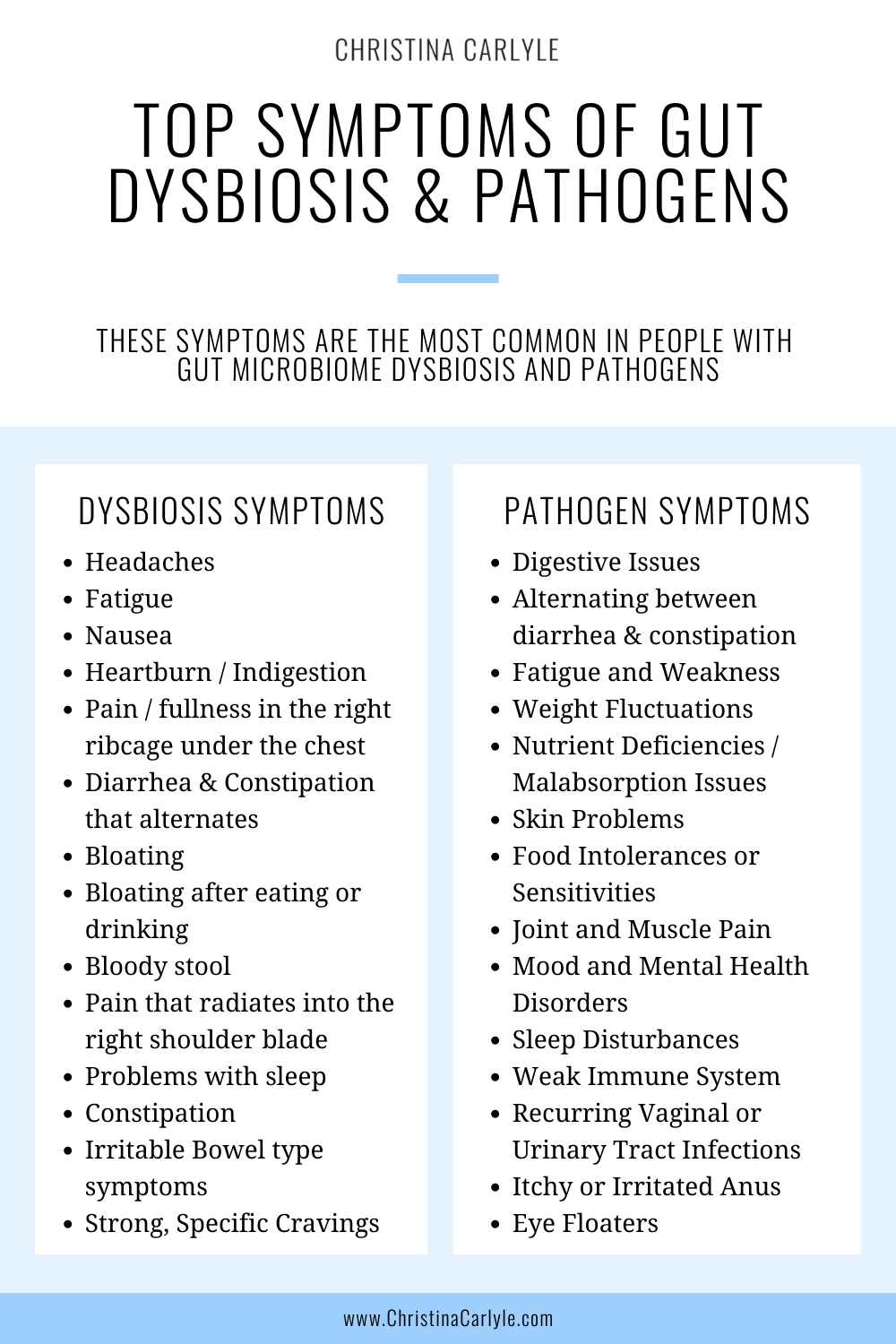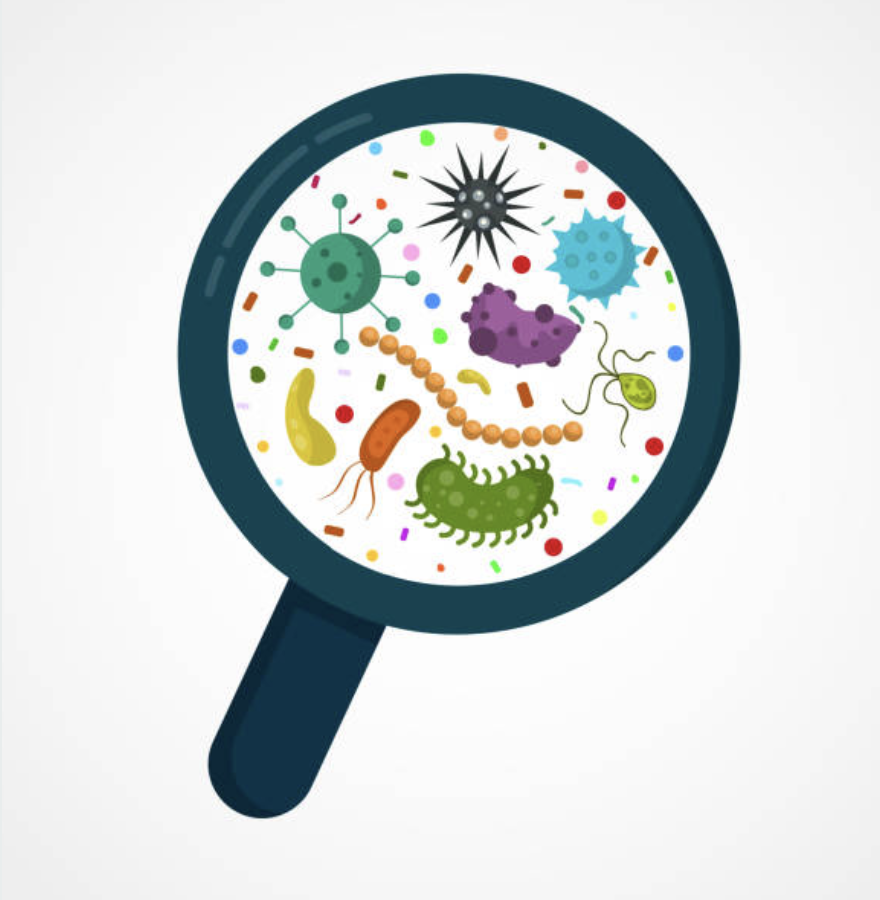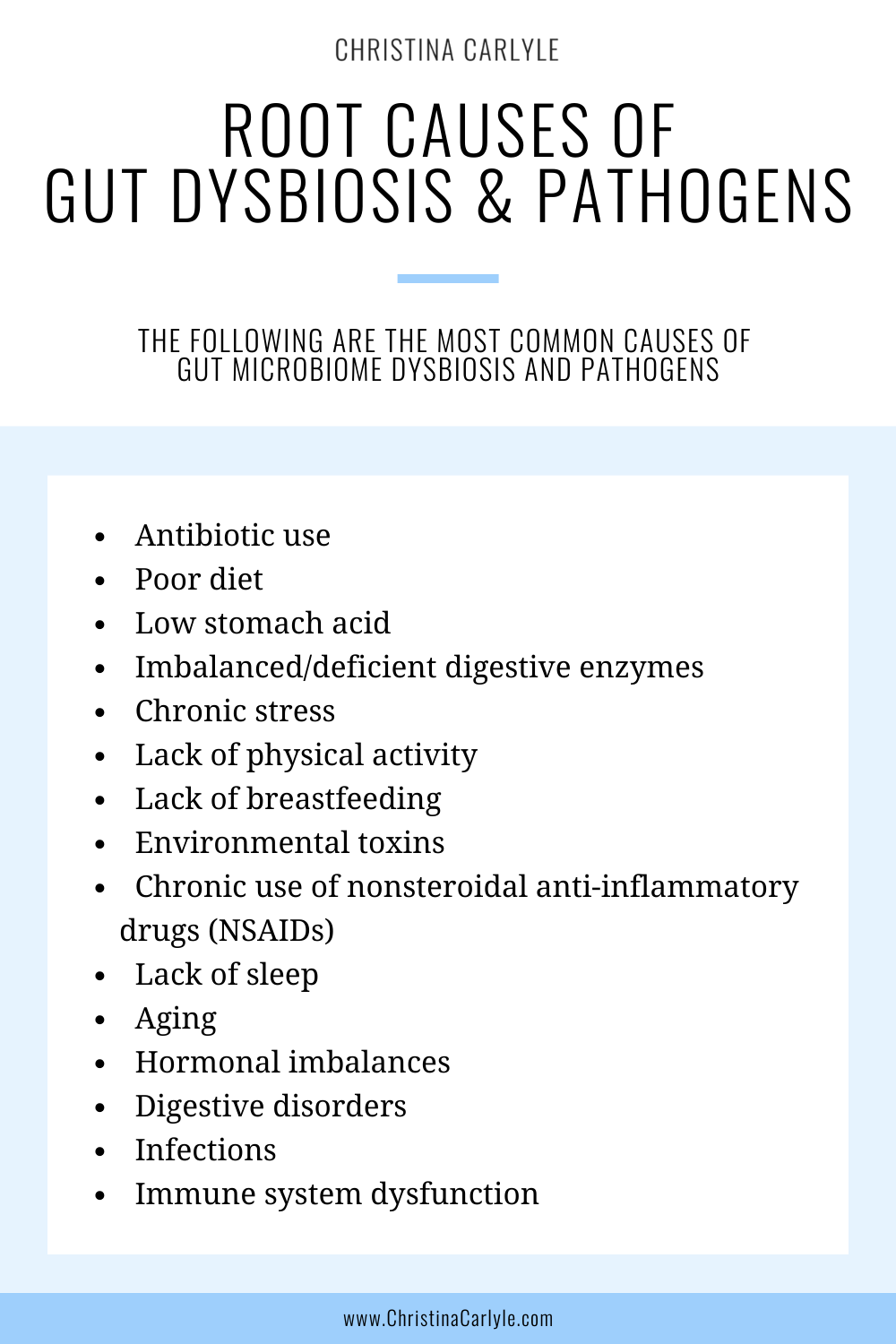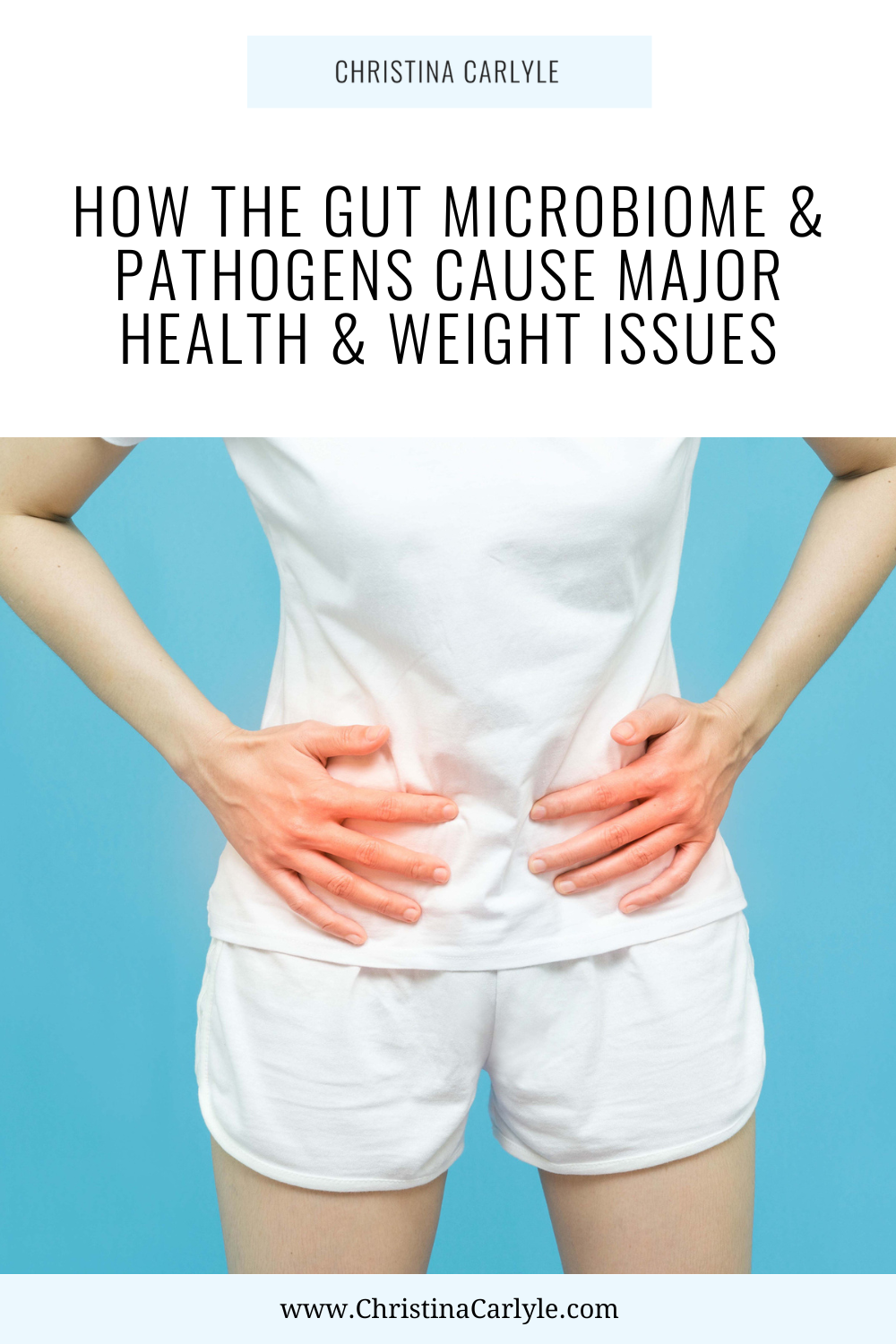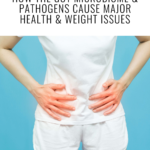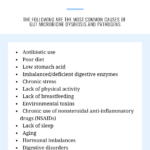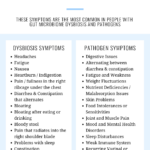Last Updated on June 22, 2023
The gut microbiome plays a HUGE role in gut health and can make or break your ability to lose weight and feel great…
and I find that most clients that I work with have no idea what the gut microbiome is, what it does, and how it affects health and weight.
That’s why I put together this guide to the gut microbiome.
You’ll learn:
- What the gut microbiome is (and where it is)
- What dysbiosis is and how it causes pathogens (and problems!!!)
- Symptoms of a gut microbiome imbalance & pathogens
- How the gut microbiome affects health (physical & mental) and weight
- What Causes Dysbiosis & Pathogens
- Easy steps to start healing and balancing your microbiome so you can lose weight & feel great ASAP
Let’s do this!
Gut health can be affected by 7 different issues. Gut health is defined as the absence of all 7 issues.
When any of the above issues are present they can domino and trigger the others.
An imbalanced gut microbiome is among one of the worst gut health issues you can have… as it can cause a TON of very serious health and weight problems, including death.
What is the Gut Microbiome?
The gut microbiome refers to the vast collection of microorganisms residing in the gastrointestinal tract. It is a highly complex ecosystem comprised of bacteria, viruses, fungi, and other microbes, with an estimated 100 trillion microorganisms. There are more microbial organisms in your body than cells and all together they weigh in at over 2 pounds!
Up to 100 genera and 1000 distinct bacterial species were identified in digestive tube niches alone.
It’s estimated that there are hundreds of thousands of different species of microbes inhabiting the human gut.
The journey of gut microbes begins in the mouth and continues through the esophagus and stomach, where some microorganisms can survive in an acidic environment.
Gut microbes primarily reside in the gastrointestinal tract, specifically in the large intestine, also known as the colon. This region of the digestive system provides an ideal environment for the growth and colonization of a diverse range of microorganisms.
Microorganisms can be beneficial or “good” or pathogenic/parasitic aka “bad.” Good and bad ‘bugs” occur naturally in the gut. But you can also pick up a bad bug via lifestyle and habits. Eating sushi, kissing, exposure to litter boxes, pets, walking barefoot, bug bites, and eating produce are all common ways that you can contract a ‘bad’ pathogenic microbe.
Natural pathogens are typically kept in check by the body’s immune system and the balance of the gut microbiome.
In a healthy individual, the gut contains a diverse microbial community consisting of beneficial bacteria, which play a crucial role in maintaining the gut’s health and preventing the overgrowth of pathogens.
When the gut is healthy certain pathogenic microorganisms can still be present in low numbers in the gut without causing harm or disease. For example, some strains of Escherichia coli (E. coli) and other potentially pathogenic bacteria can be found in the gut of healthy individuals. These strains may have a low pathogenic potential and coexist peacefully with the rest of the gut microbiota.
The important factor in maintaining health is that the gut microbiome remains in a state of balance, where beneficial bacteria dominate and prevent the overgrowth or colonization of pathogens.
The gut microbiome needs to remain balanced for optimal health & metabolic function… so if your gut becomes unhealthy, you can become unhealthy. But if you’re unhealthy, you can imbalance your gut and make yourself even worse.
The majority of gut microbes (including bacteria, viruses, fungi, and other microbes) thrive in the large intestine due to its unique conditions, including a more neutral pH, the presence of undigested carbohydrates, and the availability of nutrients.
The gut microbiome composition can vary between individuals based on factors like diet, genetics, lifestyle, and environmental exposures. Digestive enzymes and stomach acids have an effect on the microbiome, too.
Once the gut microbiome becomes imbalanced, dysbiosis and pathogens can occur… causing a TON of gut and physical/mental health issues in the process.
What is Gut Dysbiosis?
When the gut microbiome becomes imbalanced, a condition known as dysbiosis occurs. Dysbiosis refers to an alteration in the composition and diversity of the microbial community in the gastrointestinal tract.
Essentially good microbes die off and bad microbes overgrow and start to cause gut inflammation and other issues.
When dysbiosis escalates inflammation does too creating the ideal environment for pathogens to continue to overgrow.
Some of the most common pathogens that can occur as a result of untreated gut dysbiosis include:
- Clostridium difficile (C. difficile): C. difficile is a bacterium that can cause severe gastrointestinal infections, especially in individuals with compromised gut health. It can produce toxins that damage the intestinal lining and cause symptoms like severe diarrhea, abdominal pain, and inflammation.
- Candida albicans: Candida albicans is a type of fungus that naturally resides in the gut in small amounts. However, dysbiosis can lead to its overgrowth, resulting in a condition known as candidiasis. Candida overgrowth can cause symptoms such as oral thrush, vaginal yeast infections, digestive issues, fatigue, and skin problems.
- Helicobacter pylori (H. pylori): H. pylori is a bacteria that can thrive in an imbalanced gut environment. It is associated with the development of gastric ulcers and increases the risk of stomach cancer.
- Escherichia coli (E. coli): While many strains of E. coli are harmless or beneficial, certain pathogenic strains can cause infections if they overgrow in the gut. These strains can produce toxins and lead to gastrointestinal illnesses, such as diarrhea, abdominal cramps, and in severe cases, kidney damage.
- Salmonella: Salmonella is a type of bacteria commonly associated with foodborne illnesses. An imbalanced gut microbiome can allow Salmonella to proliferate, leading to symptoms like diarrhea, fever, abdominal pain, and vomiting.
- Campylobacter: Campylobacter bacteria can cause bacterial gastroenteritis, resulting in symptoms such as diarrhea (sometimes bloody), abdominal pain, fever, and nausea. Gut dysbiosis can create an environment favorable for Campylobacter overgrowth.
- Enterococcus faecalis/faecium: Enterococcus species, particularly Enterococcus faecalis and Enterococcus faecium, are bacteria that can become opportunistic pathogens in an imbalanced gut. They can cause urinary tract infections, wound infections, and bloodstream infections, especially in individuals with compromised immune systems.
- (other) Candida species: As mentioned earlier, Candida albicans is a fungus that can overgrow in the gut due to dysbiosis. However, other species of Candida, such as Candida glabrata, Candida tropicalis, and Candida krusei, can also become problematic. Candida overgrowth can lead to candidiasis, causing various symptoms and health issues.
- Aspergillus species: Certain species of Aspergillus, such as Aspergillus fumigatus, can overgrow in an imbalanced gut environment. These fungi can cause respiratory infections, particularly in individuals with compromised immune systems.
- Cryptococcus neoformans: Cryptococcus neoformans is a fungus that can cause systemic infections, particularly in individuals with weakened immune systems. It can enter the body through inhalation and can affect multiple organs, including the lungs, central nervous system, and gut.
The microbiome becomes more and more imbalanced, creating more dysbiosis, pathogens, and inflammation in the process.
As they do metabolism and immunity become affected and symptoms snowball, leading to more gut, health, and weight issues.
Inflammation is made even worse when you’re also exposed to stress or consuming inflammatory foods, drinks, alcohol, medication, and supplements. A lot of people take medication to get healthy, not realizing that it makes the gut worse.
Once inflammation becomes so bad that leaky gut occurs, pathogens leave the GI tract and start to migrate to other parts of the body. This is when things go from bad to worse.
Remember, these pathogenic bacteria, viruses, fungus, candida, and parasites are living things and all living things have survival instincts.
To ensure their survival, pathogens migrate to the liver, gallbladder, pancreas, kidney, lung, spleen, joints (all over the body), and mucosal areas like the sinuses, mouth/jaw, and vaginal canal.
Once there they bury themselves in biofilms where they remain undetected.
With leaky gut present microscopic food particles further inflame the body and organs creating the perfect environment for pathogens to thrive and multiply. As they inflame the brain, mood issues and disorder symptoms begin to manifest.
Immunity and symptoms skyrocket with pathogens, inflammation, and leaky gut present… this trio of gut health issues work hand-in-hand and it’s impossible to reverse one issue without treating all three FYI.
As pathogens colonize inside organs, eventually, an autoimmune disease or organ/system damage can occur. This is how/why thyroid, adrenal, reproductive, liver, gallbladder, kidney, metabolic, GI autoimmune disorders, and even cancer can manifest. The way a disease manifests is unique to you, the pathogen(s) you have, and what part of your body those microbes decide to live.
Remember all disease begins in the gut.
The general process of how the gut microbiome becomes impacted is:
Lifestyle Event (junk food, meds, alcohol, too much stress, meds, etc) > Inflammation > Dysbiosis/Pathogens Occur > Leaky Gut > Full Body Inflammation & Infection > Disease > Death
Even minimal gut health issues like random bloating, indigestion, irregularity, and weight gain in the gut – left untreated can eventually result in some pretty serious health issues.
At this stage, systemic inflammation becomes chronic and digestive issues and inflammation are rampant. At this point accelerated aging, joint pain, IBS and Chron’s disease or symptoms, and even colon cancer can occur.
Before there’s a diagnosis or disease, there will be symptoms of dysbiosis.
Do you have any of these symptoms?
Symptoms of Gut Dysbiosis
The most common symptoms of gut microbiome dysbiosis are:
- Headaches
- Fatigue
- Nausea
- Heartburn
- Indigestion
- Pain or fullness in the right ribcage just under the chest
- Diarrhea
- Bloating (after eating or drinking anything)
- Bloody stool
- Pain that radiates into the right shoulder blade
- Problems with sleep
- Constipation
- Irritable Bowel type symptoms
- Strong, Specific Cravings
These are the main symptoms but there are many others because different pathogens cause their own unique symptoms. For example, teeth grinding is a common symptom of candida or fungal infection. An eye issues are common with viral infections.
Once dysbiosis occurs, pathogens start to produce metabolites that influence cravings, appetite, thoughts, and food choices. This can lead to increased cravings for sugary, fatty, and processed foods, making it difficult to stick to a healthy diet.
Processed meat (inorganic, chicken), alcohol, cheese/dairy, sugar/carb cravings, and cravings for a specific processed food/drink are very common when you have dysbiosis and pathogens.
These ‘bad’ junk foods create more inflammation, dysbiosis, and imbalance of stomach acids and digestive enzymes that lead to nutrient imbalances and deficiencies.
This creates an opportunity for pathogens to take over your body.
If you have any of the following pathogen symptoms I’d strongly recommend lifestyle intervention to boost your gut health ASAP.
PATHOGEN SYMPTOMS
Here are the tell-tale symptoms of bacteria, candida, fungus, viruses, amoebas, flukes, and/or worms.
- Digestive Issues: GI Symptoms, specifically persistent diarrhea, chronic constipation, alternating diarrhea and constipation, bloating, gas, abdominal pain, cramps, and unexplained changes in bowel habits.
- Fatigue and Weakness: Feeling tired or unexplained fatigue and weakness consistently despite eating healthy and exercising. (Fatigue occurs because pathogens are stealing nutrients and inflaming the body.)
- Weight Fluctuations: Unexplained weight loss or weight gain despite no significant changes in diet or exercise. Also, stubborn fat despite dieting and exercising.
- Nutrient Deficiencies/Malabsorption Issues: Deficiencies in essential nutrients, such as iron, vitamin B12, or vitamin D, due to impaired absorption caused by gut health issues.
- Skin Problems: Skin conditions like rashes, hives, eczema, acne, or persistent itching. Resistant jock itch, athlete’s foot, acne, small flesh-colored bumps, and hyperpigmentation are also common skin issues caused by internal fungal infections.
- Food Intolerances or Sensitivities: Increased sensitivity and allergies to certain foods (you used to eat without issues), leading to symptoms such as bloating, gas, abdominal discomfort, or diarrhea after consuming specific foods.
- Joint and Muscle Pain: Unexplained joint pain, muscle aches, or stiffness that may be associated with gut health issues.
- Mood and Mental Health Disorders: Mood swings, anxiety, depression, irritability, brain fog, poor concentration, or memory problems.
- Sleep disturbances: Insomnia, restless sleep, or difficulty falling asleep or staying asleep, which can be linked to gut health imbalances.
- Weak Immune System: Frequent colds, infections, allergies, or a general feeling of being unwell due to compromised immune function associated with gut health issues.
- Recurring Vaginal or Urinary Tract Infections: Recurring vaginal yeast infections or urinary tract infections (UTIs) in women may be indicative of an imbalance in gut microorganisms.
- Itchy or Irritated Anus: Persistent itching around the anus, which is a symptom of certain parasitic infections. Especially during the full moon, which is when parasites breed.
- Eye Floaters: Seeing small specks, dots, or cobweb-like shapes drifting across your field of vision, which can be attributed to changes in the vitreous humor in the eye. While eye floaters are generally harmless, in some cases, they may be linked to underlying systemic health conditions.
I also want to note again – that pathogens are experts at hiding. They bury themselves in biofilms that make it difficult to detect them.
If you have normal labs but also have the GI symptoms above you most likely have a pathogen.
You can also have a negative stool test for parasites and still have parasites.
Whether microscopic or a foot-long worm – pathogens are very good at hiding themselves and make it their mission to live undetected, for life.
HOW THE MICROBIOME AFFECTS HEALTH (AND WEIGHT)
There are so many different gut microbes and each affects the gut, immunity, and metabolism in different ways that can vary depending on your unique biology, lifestyle, and genetic factors.
Here are the most common ways that issues within your gut microbiome and symptoms start to snowball and affect your health and weight:
- Digestive Issues: Dysbiosis can lead to digestive problems such as bloating, gas, constipation, diarrhea, and irritable bowel syndrome (IBS). The disruption in microbial balance can affect the breakdown and absorption of nutrients, potentially leading to malabsorption and nutrient deficiencies. Bloating, fatigue, food allergies, and cravings at this stage make it hard to feel motivated and stick to a diet.
- Inflammation: An imbalanced gut microbiome can trigger chronic low-grade inflammation in the gut. All inflammation triggers the gain of water weight. This inflammation, in turn, may contribute to the development of inflammatory bowel diseases (IBD) such as Crohn’s disease and ulcerative colitis. Overgrowth of certain pathogens has been linked to increased inflammation, tissue damage, and disruption of the gut barrier function. GI Inflammation + Pathogen Inflammation causes inflammation to go from acute to chronic to systemic & chronic.
- Weight Gain & Obesity: Studies have shown that an imbalanced gut microbiome is associated with metabolic dysfunction, weight gain, and obesity. Certain microbes in the gut can extract more energy from food, leading to increased calorie absorption and weight gain. There’s also scientific evidence that one particular strain of probiotic can cause weight gain. Dysbiosis may also impact metabolic processes and contribute to insulin resistance and the development of type 2 diabetes. If you gain weight exclusively in your stomach you have gut health issues.
- Mental Health Disorders: Emerging research suggests a connection between the gut microbiome and mental health. An imbalanced microbiome has been linked to conditions such as anxiety, depression, and even neurodevelopmental disorders like autism spectrum disorder. The gut-brain axis, a bidirectional communication system between the gut and the brain, plays a role in these associations. Remember microbes can influence your thoughts and cravings for processed foods, sugar, carbs, alcohol, dairy, and other things that make it hard to lose weight, too. Feeling out of control over food plus subsequent weight gain, further worsen mental health issues.
- Nutrient Malabsorption: Pathogens can interfere with the normal digestion and absorption of nutrients in the gut. They can disrupt the functioning of the intestinal cells responsible for nutrient uptake or compete with the host for essential nutrients, leading to malabsorption. This can result in nutrient deficiencies, weight loss, and other related health issues.
- Immune System Dysfunction: The overgrowth of pathogens can impact the gut’s immune system, leading to immune system dysregulation. It can weaken the immune response to pathogens, making individuals more susceptible to infections. Alternatively, the immune system may become overactive, leading to chronic inflammation and autoimmune reactions.
- Increased Disease Risk: Dysbiosis has been implicated in various health conditions, including metabolic disorders (obesity, diabetes), cardiovascular disease, colorectal cancer, and liver diseases. Overgrowth of specific pathogens in the gut has been associated with an increased risk of certain diseases. For example, Helicobacter pylori (H. pylori) is a gut pathogen that can lead to gastric ulcers and increases the risk of stomach cancer. Other pathogens may contribute to colorectal cancer, liver diseases, and other gastrointestinal disorders.
- Antibiotic Resistance: Overgrowth of pathogens can contribute to the development of antibiotic resistance. When exposed to antibiotics, some pathogens can acquire genetic changes that make them resistant to these medications. This can make infections caused by these pathogens more difficult to treat effectively.
Enough about the problem… let’s get into the solution. Step 1, you need to know what causes dysbiosis and pathogens. Then eliminate/address as many as possible asap.
What causes Dysbiosis and Pathogens?
Lifestyle is a direct contributor to the gut. The following all contribute to gut dysbiosis and create the perfect environment for pathogens to thrive.
- Antibiotic use: Broad-spectrum antibiotics can disrupt the gut microbiome’s balance by killing harmful and beneficial bacteria. Opportunistic pathogens grow when beneficial bacteria are weak or less populated.
- Poor diet: Consuming a diet high in processed foods, refined sugars, artificial additives, caffeine, and alcohol and low in fiber or nutrients can negatively impact the diversity and balance of gut bacteria. A diet that consists of imbalanced macronutrients or that removes complete macro/micro food sources and complete food groups are common causes of dysbiosis. The keto diet, Weight Watchers, IIFIYM, and Adkins diets can all create dysbiosis in the gut…. and furthermore – because they’re nutritionally imbalanced, immunity/metabolism tends to decrease, further creating an environment that allows pathogens to thrive.
- Low stomach acid: Stomach acid plays a crucial role in the digestion and breakdown of food, as well as in preventing the overgrowth of pathogens. When stomach acid levels are low, it impairs the efficient digestion and sterilization of ingested food. This can lead to undigested food particles reaching the intestines, providing an opportunity for pathogens to thrive and disrupt the balance of the gut microbiota. Stomach acid needs to be balanced to properly balance the gut.
- Imbalanced/deficient digestive enzymes: Digestive enzymes, produced by the pancreas, play a key role in breaking down carbohydrates, proteins, and fats into smaller molecules that can be absorbed by the body. When there is an imbalance or deficiency of digestive enzymes, the breakdown of food is compromised. This can result in undigested food particles reaching the intestines, where they can serve as a food source for pathogenic bacteria and contribute to dysbiosis. Supplementing with enzymes is needed to
- Chronic stress: Prolonged stress can affect the gut-brain axis and alter gut motility, secretion, and permeability, potentially leading to dysbiosis.
- Lack of physical activity: Sedentary lifestyles and lack of exercise have been associated with alterations in gut microbial composition.
- Lack of breastfeeding: Infants who are not breastfed or receive limited breastfeeding may have a higher risk of gut dysbiosis due to the absence of beneficial bacteria transmitted through breast milk.
- Environmental toxins: Exposure to environmental pollutants, such as pesticides, heavy metals, and air pollution, can disrupt the gut microbiome.
- Chronic use of nonsteroidal anti-inflammatory drugs (NSAIDs): Frequent or long-term use of NSAIDs, such as ibuprofen or aspirin, can negatively impact the gut microbiome.
- Lack of sleep: Sleep disturbances or insufficient sleep may affect the gut microbiome and impair gut health.
- Aging: Age-related changes in the gut, such as reduced diversity and altered microbial composition, can contribute to dysbiosis.
- Hormonal imbalances: Hormonal fluctuations, such as those occurring during menopause, can influence the gut microbiome and contribute to dysbiosis.
- Digestive disorders: Conditions like inflammatory bowel disease (IBD), irritable bowel syndrome (IBS), and celiac disease can contribute to gut dysbiosis and increase the risk of pathogenic overgrowth.
- Infections: Previous or recurring gastrointestinal infections can disrupt the gut microbiome and contribute to dysbiosis.
- Immune system dysfunction: Weakened immune function, either due to underlying health conditions or immune-suppressing medications, can increase the risk of gut dysbiosis and pathogenic infections.
Steps To Balance and Heal the Gut & Microbiome
To begin balancing your gut, address all of the root causes of gut health issues and the root cause issues listed above.
But you have to balance the gut strategically… especially if you have pathogens.
You just can’t go off taking a bunch of anti-microbials and parasite-killing cleanses. No ma’am!
When pathogens die they release up to 79 different toxins. These toxins lead to symptoms such as diarrhea, abdominal pain, vomiting, fever, joint pain, and soreness. So if you try to kill them too fast, you’ll most likely fail.
So it’s best to start by radially reducing root causes of pathogens & dysbiosis before attempting to kill them.
Here’s a simple protocol to help reverse gut dysbiosis, that boosts gut health and metabolism so you can reverse symptoms and lose weight:
- Cut out all inflammatory pathogen-friendly sources of foods, drinks, supplements, and consumables & eat a diet that promotes gut health and healing. You can’t heal the gut simply by eating healthy… you have to avoid the wrong things and eat the right things to heal the gut and reverse inflammation, microbiome, hormone, toxicity, metabolic, and nutrient absorption issues. That’s what my Total Transformation Program does and why it works so well (& quickly!)
- Heal and balance your gut with these Gut Health Supplements.
- Eat high Probiotic and Prebiotic foods with every meal. (at least one serving of both pre/pro per meal.)
- Eat Gut Healing Foods. These have the nutrients, fibers, and plant chemicals needed to heal and balance all aspects of the gut. Eat 1-2 servings of these Gut Healing Foods with every meal.
- Engage in a healthy lifestyle & other healthy habits that support gut health and metabolism (like stress management, hydration, exercise, supplementation, etc. – all of which are covered in my Total Transformation Program.)
- Radically reduce stressors in your life and use healthy coping skills.
\When you combine the right diet + healing protocols & supplements you’ll get results you can see and feel a LOT faster.
If you really want to clean up your diet, heal your gut, reverse inflammation, balance hormones, and get rid of fatigue and cravings – AND lose weight – you need my Total Transformation Program.

4 week before and afters using my Total Transformation Program
Remember, if you have gut health symptoms you most likely also have metabolic dysfunction. This free training explains more about metabolic dysfunction & how I fix it so you can lose weight & feel great ASAP.
Once metabolism, elimination, healing, and health is optimized for 4-8 weeks then you can start introducing antimicrobial and antifungal supplements.
The types of supplements you need depends on the unique cause of dysbiosis and the pathogen(s) you have.
Viruses, bacteria, fungus, amoebas, and parasites all have their own unique protocol to reverse symptoms and issues….
But co-infections are quite common…
Dysbiosis, Single infection, and Co-infection protocols vary greatly depending on the symptoms, infection(s), deficiency/excess imbalances (of nutrients, acids, enzymes, hormones, and metabolites) and lifestyle of the individual being treated.
That’s why I highly recommend using a practitioner that can perform the different (correct/accurate) diagnostic tests needed to pinpoint the exact cause of your dysbiosis and pathogens.
Because you can do a lot of damage to the gut if you take too little/too much of the wrong/right things. And if your gut isn’t healed first, then you won’t be able to properly absorb the nutrients needed to reverse the damage.
That’s why it’s best to remove the root causes of dysbiosis/pathogens, then heal the body first to prepare to balance/kill as needed.
I hope this helped you! If you need any help healing your gut feel free to reach out. I’m happy to point you in the right direction.
Your Coach & Biggest Cheerleader,
![]()
MORE GUT HEALTH & WEIGHT LOSS INFO
Check out these related articles to fill in more of the “gut health puzzle” so you’ll understand more about the different aspects of gut health, how they cause symptoms & weight gain, and how to optimize your gut health to maximize your weight loss potential:
- Gut Health and Weight Loss
- What are Probiotics?
- Probiotics and Weight Loss
- What are Prebiotics?
- The Best Foods for Gut Health
- What is Leaky Gut?
- Gut Health Supplements
- Intestinal Inflammation
- Gut Microbiome
Remember, if you have gut health symptoms you most likely also have metabolic dysfunction. This free training explains more about metabolic dysfunction & how I fix it so you can lose weight & feel great ASAP.

